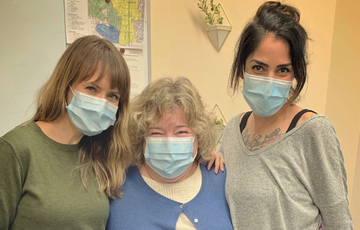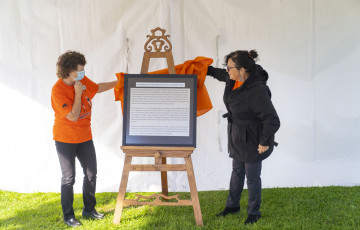Effective June 3, 2024 – Administrative fees for Environmental Public Health will increase for comfort letters and temporary food applications not received 14 days before an event. These changes will align Island Health’s fee structure with those at other health authorities.
- The fee for an initial comfort letter will be $150; additional letters based on the same property will be $50 (previously all fees were $50).
- Temporary food applications not received 14 days before an event will be $50 (no fee applied previously).
Environmental Health Officers (EHO) conduct more than 7,000 inspections of restaurants, food facilities and stores annually. Find food facility and inspection information.
EHOs educate food handlers and consumers about safe food handling practices.
Opening a Restaurant, Mobile Food Vending Unit or Other Food Premises
Under the Food Premises Regulation, a food premises refers to any place where food intended for public consumption is offered for sale, supplied, handled, prepared, packaged, displayed, served, processed, stored, transported or dispensed.
If you wish to operate a food premises, you must submit an application to the local Health Protection and Environment Services office prior to construction or operation. Operating permits and approvals are not transferrable to new owners.
Your application package must include:
Application form
Food Safety Plan
Sanitation Plan
Permit fee
Water
Food facilities are required to connect to a water system that complies with the Drinking Water Protection Act and Regulations, along with a valid operating permit.
Wastewater
Food facilities also require a waste disposal system in compliance with the appropriate government agency. Your existing system may require review and upgrading. Your local Environmental Health Officer can provide more information.
Permit or Approval to Operate
When a facility is ready to open, the Environmental Health Officer conducts a pre-opening inspection. When compliance with the Food Premises Regulations is achieved, you will be issued a written permit or approval to operate.
FOODSAFE
Restaurant operators must hold a valid FOODSAFE certificate or a Food Handlers Training Course. At least one employee present must hold a valid FOODSAFE certificate if the operator is absent.
If you require a replacement FOODSAFE certificate, please call 250-737-2017 or email foodsafe@islandhealth.ca.
All FOODSAFE Level 1 certificates issued in British Columbia are valid for five years. To recertify, simply retake the FOODSAFE Level 1 course or take the FOODSAFE Level 1 Refresher online course.
Temporary Food Markets and Events
Temporary Food Markets are markets where vendors are local farmers, artisans or crafters that sell fresh produce, baked goods, handmade crafts and artisan goods directly to consumers and include farmers markets, craft markets or similar.
Market Managers are required for temporary food markets and it is their responsibility to ensure requirements of the Guidelines for Sale of Food at Temporary Food Markets are met. A Market Manager Application form should be submitted to the local Environmental Public Health Office at least 14 business days prior to the market.
To sell lower risk food items at farmers markets and other temporary food markets, consult with your Market Manager and review requirements outlined in the Guidelines for Sale of Food at Temporary Food Markets.
To sell higher risk food items at temporary food markets, complete an Application for Sale of Higher Risk Food at Temporary Food Markets and submit it to the local Health Protection and Environmental Services office for approval. A letter of confirmation is required and should be kept with you at your market.
Onsite food preparation is not permitted by market vendors. If onsite food preparation is proposed, complete an Application to Operate Temporary Food Service and submit to your local Environmental Public Health office.
Temporary Food Events are public gatherings that are held on a temporary basis such as fairs, festivals, fundraisers and conventions. An Event Coordinator is required for temporary events who is responsible for the event and must submit a Temporary Event Coordinator Application to the local Environmental Public Health office.
To provide food at temporary events, complete an Application to Operate Temporary Food Service and submit to your local Environmental Public Health office. Applications must be received at least 14 business days prior to the event. A $50 administration fee will be applied to all applications received less than 14 days prior to the event. Submissions received less than 2 business days prior to an event may be denied.
A temporary food service permit can only be used a maximum of 14 days per calendar year and the temporary food service permit must be issued prior to food service. Home-prepared food for the public is not allowed at temporary events. An approved commercial kitchen must be used for any preparation done prior to the event.
Refer to the Planning Guide for Temporary Food Events and Markets for more information.
Resources
Food Safety Guidelines and Applications
Food Donation Guidelines
Guidelines for Temporary Food Concessions Food Prep
Guidelines for Temporary Food Concessions No Food Prep
Temporary Event Coordinator Application
Mechanically Tenderized Beef
Deep Fryers and Frying Oil
Sous Vide Cooking Safety
Mobile Food Premises Guidelines
BCCDC Food Premises Guidelines
Guidelines for the Production of Dairy Products in Food Establishments
Consumer Information
Food Recall Warnings (Canadian Food Inspection Agency)
Vancouver Island Inspection Reports
Power Failure Protecting Food Tips
Healthy Eating Habits (HealthLinkBC)
Recommended precautions for water and food affected by fire retardants
Shellfish Webmap (BCCDC)
Sea Surface Temperatures Map
Food Premises Guidelines - Vibrio and oyster control
Shellfish Harvesting and Control
Business Information
Ensuring Food Safety - Writing Your Own Safety Plan
Opening a Food Service Establishment
Monthly Temperature Log Sheet
BC Meat Inspection Licensing (Slaughterhouse)
Food Protection (Vital to Your Business)
MOH Food Protection
Signs
Wash Your Hands
No Smoking
No Animals
Employees Only
Three-Sink Dishwashing Method
Help us Help you



